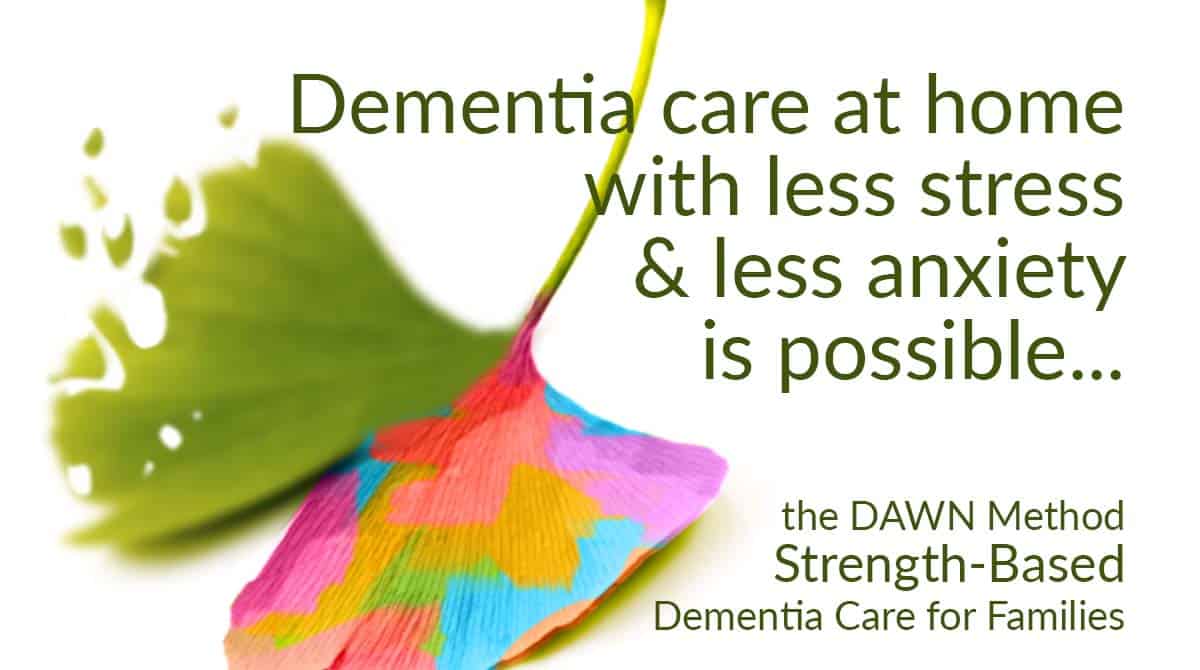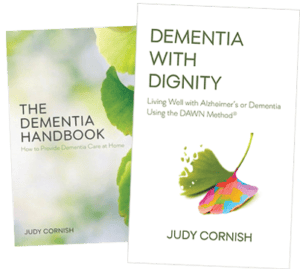Understanding why and how mindfulness is helpful with dementia requires thinking about the meaning of a few words first. It’s worth doing. When I began spending time with people who were experiencing dementia, they unlocked a world of beauty and happiness for me: they led me to mindfulness like unwitting monks.
To start, we need to be sure we don’t associate the term “dementia” (the condition of progressively losing certain cognitive skills) with the word “demented,” which has come to mean being crazy. When we experience dementia we do not become crazy. We lose some cognitive skills, not all, and the ones we keep are the ones we need to enjoy living in the present.
Which brings us to mindfulness. The purpose of exercising mindfulness is to stay in the present—because beauty, companionship and all the good things in life are accessible in the present (not the past or future). We miss out when our minds and attention wander to the past and future, and away from what is right in front of us, ready to enjoy.
So, is mindfulness helpful with dementia? The short answer is oh yes: those who are the companions of people experiencing dementia benefit from mindfully choosing to be in the present with them. However, for those of us experiencing dementia, there is no need to try to be mindful, because we are losing the very skills that would distract us from the present.
The greatest truth about working with dementia is this: Dementia takes away our ability to leave the present, and our ability to shape the present, but not our ability to enjoy it.
Why mindfulness and dementia are complementary
Let’s think for a moment about which skills we need to be mindful, and which we lose to dementia.
We need our attention skills to be mindful—to choose where we put our attention. We need them because our memory skills are constantly presenting us with memories, and our rational thinking skills are constantly presenting us with possibilities and problems and actions we could take to achieve or avoid results. Hence, this array of skills gives us access to a lot of information but carries a penalty: distraction from what’s going on around us in the present. When we choose to be mindful, we have realized that the good things in life are in the present, and we train our minds to be more conscious of the present and all that’s enjoyable there.
Now, let’s think about which skills we lose to dementia. We lose our rational thinking skills and our memory skills, and our ability to manage our attention. Losing the first two means we lose access to a lot of information but we also lose those sources of distraction. Losing the latter means we are susceptible to having our attention grabbed by whatever is around us.
What does all this mean, then? It means that when we work with dementia, we can enhance life for both those who’re experiencing it as well as those who are their companions. This happens because the skills that dementia takes away leave us trapped in the present, while the skills it leaves are those that equip us to enjoy the present (our intuitive thinking skills).
Our intuitive thought processes enable us to recognize our own feelings and the feelings of others, savor beauty, and enjoy all the information our senses bring to us (anything we can see, hear, smell, taste or touch). That means we retain the ability to revel in all the best things in life—anything that is beautiful as well as our relationships with other people. It’s a lot of fun to spend time with someone who lives in the intuitive world—if you understand that you’re the one who needs to find and bring what’s beautiful, and stop expecting them to use skills they no longer have.
How do we enter the intuitive world with them?
Stay in the present.
Stay in the present. If you stop thinking about the past and future, you are left with what you can see, hear, touch, feel, smell and taste—in the present. The present is filled with sensory stimulation, if you still your rational mind and pay attention. Look around. Listen. Breathe. Be.
Shape the present.
Shape the present. Bring something with you to share: something that tastes good or smells good, or flowers, fabrics, buttons, scrapbooks—everything and anything can provide positive sensory stimulation. Find the music that makes your companion’s heart sing and create playlists so you can listen to it together. When we lose our memory and rational thinking skills, we lose the ability to recall what we like as well as the ability to go find it. We lose the ability to shape our worlds.

Get out and go.
Get out and go. Life is lived best as a treasure hunt. Do you really have to sit at home or in a care facility? Could you not take your companion out for a drive, out for a latte, to a quiet parking spot in a park to watch children play, or a bench in a crowded square to watch people? It’s emotionally painful for our brains to have too little sensory or social stimulation. Agitation, exit-seeking, combative behaviors aren’t really dementia behaviors; they’re the behaviors we humans exhibit when we’re feeling stressed or afraid or uneasy.
Let the DAWN Method help.
The DAWN Method is designed to help families and caregivers learn how to support the skills lost as well as enrich the present for people who’re living with dementia. When we work with dementia, people experiencing it begin to feel safe and relaxed and happy because they’re well equipped to enjoy beauty and companionship in the present. It’s an amazing transformation. Many of the people I’ve worked with are able to stay home and take part in activities in the community, with a careteam that grows with their needs, and never move into long-term care.
In sum, dementia doesn’t make us crazy, although the experience will be marked with stress and conflict if our companions don’t realize what we can and cannot do. When our companions fill the present with beauty and companionship for us, both of us can enjoy it. This treasure hunt approach to life (being mindful) is the best way to give yourself a break from the stresses of modern life—especially when you’re providing care for someone.
§




